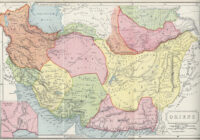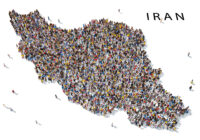US withdrawal from the Iran nuclear deal might be welcome to Iran’s supreme leader and conservatives in government.
Losing an Enemy: Obama, Iran and the Triumph of Diplomacy, by Trita Parsi, is an account of how a long-running fear that Iran was intent on acquiring nuclear weapons was resolved by diplomatic means. President Barack Obama, and his view of Iran, so very different from that of President Donald Trump, is at the center of the story.
Obama entered the White House intending to negotiate with Iran. By the end of 2009, the violent consequences of a disputed Iranian presidential election and Tehran’s hesitant reaction to Obama’s opening gambit had undermined his resolve. He switched to a policy of coercion, “ratcheting up the pressure” through a range of sanctions. But, during 2012, it became apparent to him that sanctions were a losing and dangerous tactic. Iran had responded by expanding the nuclear capability that caused most concern: enriching uranium for reactor fuel but, also, potentially for nuclear weapons. The Israeli government had threatened to bomb Iranian facilities, hoping that this would bring about a US military intervention.
So, after his re-election, Obama switched back to diplomacy. He was able to take advantage of an top secret channel to Iran’s Supreme Leader Ayatollah Khamenei, created by the Sultan of Oman in 2012. He could also count on the wholehearted support of John Kerry, his new secretary of state. Kerry shared Obama’s aversion to war and, as a senator, had encouraged the sultan’s initiative.
At a secret meeting in Oman in March 2013, the Iranians heard what they had wanted to hear for 10 years: The United States could tolerate an Iranian enrichment capability, subject to stringent international monitoring and restrictions, to be agreed. The odds on a deal had shortened.
They shortened further when Hassan Rouhani won Iran’s 2013 presidential election and appointed Javad Zarif foreign minister. Both were highly able realists. Both had a thorough understanding of the nuclear problem from their roles in negotiating with Britain, France and Germany a decade earlier. (A “no” to Iranian retention of enrichment technology had caused that process to fail.) Obama still faced opposition to a compromise solution from the governments of Israel and Saudi Arabia, and from their many friends in Congress.
Parsi, the president of the National Iranian American Council, sets out evidence that these governments were less worried about nuclear advances in Iran than their public statements implied. What they really feared was an end to the policy of containing Iranian power and influence. They saw portraying Iran as a nuclear proliferator and a threat to their existence as a means to an end of minimizing Iran’s ability to compete regionally. In 2010 Robert Gates, then secretary of defense, had said of the Saudis that they were always eager to “fight the Iranians to the last American.”
Israeli and Saudi goals put them at odds with Obama. Obama believed that “Iran will be, and should be a regional power.” These differences came to a head in the weeks that followed a final agreement with Iran on July 14, 2015. Congress had demanded and obtained an opportunity to pass judgement on the deal, despite it being a political agreement, not a treaty. That congressional battle resulted in defeat for Israel and Saudi Arabia. Obama, who, at one point, said to an ally in the Senate, “I think you over-estimate the rationality of the body in which you serve,” was able to limit the number of senators wanting him to repudiate what his negotiators had achieved.
Obama won by framing the deal as the only alternative to war, by exploiting the American public’s disillusionment with war as an instrument of policy and by mobilizing the pressure of pro-diplomacy activists on members of Congress. This success could have been followed by an attempt to alter how the average American views Iran. Parsi only alludes to this and does not explain why Obama let that opportunity pass.
Instead, the author explores whether the deal can survive without a broader improvement in US-Iran relations. He concludes it cannot. President Trump’s Iran policy will test this thesis by eliminating all possibility of an improvement for the foreseeable future. An alternative view would be that the deal can survive a worsening of relations and even US withdrawal from the agreement, as long as US allies resist US pressure to follow suit.
Provided Iran remains in compliance with its nuclear non-proliferation obligations, and provided international inspectors find no evidence of undeclared nuclear activities or material in Iran, allied resistance is likely. Europe and Asia have much to gain from the agreement and a strong interest in encouraging Iran to prize it. US participation was essential to the birth of the deal; its rearing can be entrusted to the rest of the world.
US withdrawal might even be welcome to Iran’s supreme leader and Iranian conservatives, whi fear an improvement in US-Iran relations as a potential threat to the survival of Iran as an Islamic Republic. They make political use of US hostility.
Losing an Enemy can please and enlighten the general reader, and serve as a reliable quarry for students of international and US politics. It does admirable justice to one of the few major diplomatic achievements of the last 16 years.
*[Losing an Enemy: Obama, Iran and the Triumph of Diplomacy is published by Yale University Press.]
The views expressed in this article are the author’s own and do not necessarily reflect Fair Observer’s editorial policy.
Photo Credit: John Gress Media Inc / Shutterstock.com
Support Fair Observer
We rely on your support for our independence, diversity and quality.
For more than 10 years, Fair Observer has been free, fair and independent. No billionaire owns us, no advertisers control us. We are a reader-supported nonprofit. Unlike many other publications, we keep our content free for readers regardless of where they live or whether they can afford to pay. We have no paywalls and no ads.
In the post-truth era of fake news, echo chambers and filter bubbles, we publish a plurality of perspectives from around the world. Anyone can publish with us, but everyone goes through a rigorous editorial process. So, you get fact-checked, well-reasoned content instead of noise.
We publish 2,500+ voices from 90+ countries. We also conduct education and training programs
on subjects ranging from digital media and journalism to writing and critical thinking. This
doesn’t come cheap. Servers, editors, trainers and web developers cost
money.
Please consider supporting us on a regular basis as a recurring donor or a
sustaining member.
Will you support FO’s journalism?
We rely on your support for our independence, diversity and quality.







